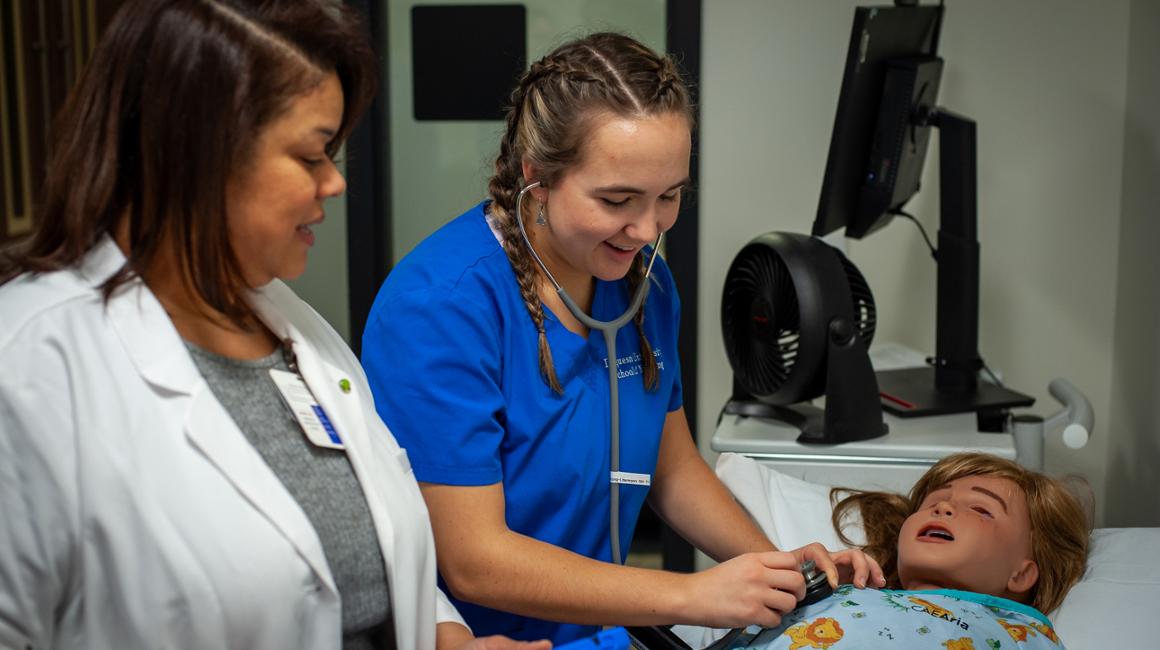At Duquesne University School of Nursing, clinical practice is at the core of our faculty’s teaching methods. We believe that clinical practice is an invaluable part of any nursing student’s education. The Learning and Simulation Center was developed as a space dedicated to creating a deeper learning experience for students. The Center offers an array of technology that increases realism, improves the quality of patient evaluation skills and enhances clinical learning. The Center’s goal is to create meaningful experiences through which students can grow into competent and confident professionals. The 7,000 square foot space includes learning opportunities through high-fidelity simulations, health assessment skills practice, augmented reality, fundamentals practice, pediatric assessment techniques, practice with patient simulators and experience with wearable simulators.
One of the newest additions to the lab is Aria, a high-tech pediatric mannequin, which was purchased through Dr. Kathleen Sekula’s, grant. Dr. Sekula, PhD, PMHCNS-BC, FAAFS, FAAN, Professor and Noble J. Dick Endowed Chair in Academic Leadership, is the Project Director for the HRSA Advanced Nursing Education – Sexual Assault Nurse Examiners Grant. Dr. Angela Karakachian, PhD, RN and Assistant Professor, wasted no time in putting the new technology to use to educate her students.
Dr. Karakachian created the pediatrics lab stations to teach students critical thinking and enhance their decision-making skills with no risk of causing harm to children, who are particularly vulnerable. She points out, “Evidence shows that nursing students lack the skills to apply their knowledge in practice, especially when it comes to caring for children.” As anyone could imagine, children are not the most willing patients, particularly when it comes to a new nurse lacking confidence in hands-on patient care. With Aria and the pediatric lab, Karakachian is working to mitigate this learning curve.
She goes on to say, “The majority of students have never been around children much less around sick children. The pediatric lab stations help improve student nurses’ confidence in caring for children and practice their skills in a safe environment before going into a hospital setting.” In the pediatrics labs, students rotate between stations learning techniques on everything from swaddling a newborn to providing injections to babies. In addition to Aria, students work with SimBaby© to get used to handling and providing care to infants. Karakachian mentions, “Caring for children is wonderful, but it can also be scary. I hope that students understand that the lab experience is meant to help them build their confidence and apply their learning in practice.”
As for Aria, Karakachian says, “Aria is a very high-tech pediatric mannequin. Students can practice many of their skills such as checking vitals, assessing for signs of trauma (head trauma, burns, etc.), checking blood glucose and checking for pulses. Aria has the ability to talk and cry just like a child would. This is truly a great addition to the pediatric course. We are forever grateful to Dr. Sekula and her grant.” The manikin is designed to develop critical decision-making skills and support life-saving pediatric care. Training with Aria is actually proven to reduce medical errors, improve performance and enhance care delivery to adolescents.
Aria simulates a 7-year-old-child, offering interchangeable gender, 60 vocal expressions and sounds, an advanced airway and neurological features and 10 simulated clinical experiences. The simulation training supports the most common and emotionally charged pediatric emergencies, from an accidental overdose to a gunshot wound. Students can make assessments, apply clinical decision-making and provide medical interventions in a risk-free environment so they’re ready for the real thing. Karakachian points out, “I would like my students to know that although child care can be intimidating, it is something they all may have to do at some point in their nursing careers whether they choose pediatric nursing or not. I encourage them to stay open minded and to remember that when they are caring for sick children they are also caring for the whole family!”
Having the hands-on practice with Aria will allow the students to have the confidence in the future when caring for a child while they may also have to simultaneously calm the family down. Such a high stress situation would be almost impossible to prepare for without technology like Aria and the pediatrics lab. Living the mission to care for the most vulnerable populations, like children, means preparing students to take on real-life situations with poise and assurance. The School of Nursing is committed to providing the technology students need to be leaders in health care. The Learning and Simulation Center is exactly the jumpstart students need to enter the next phase of their education in acute care facilities with the knowledge they need to be successful.
In fact, as the new year begins, an additional technological training simulation piece will be added to the lab. Thanks to a generous gift from the School of Nursing Alumni Association, injectable legs will be incorporated into the pediatrics lab. The School is committed to staying on the cutting edge of educational technology to make sure students are prepared and ready to enter the health care field
News Information


